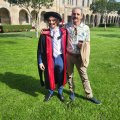Understanding how the mineral sulphate works in the body could hold the key to future cures for reduced fertility, according to a University of Queensland researcher.
The research could also lead to treatments for other human disorders such as seizures, growth retardation and gastrointestinal disturbances.
School of Biomedical Sciences senior lecturer Dr Daniel Markovich has been awarded $65,000 as one of seven winners of the 2003 UQ Foundation Research Excellence Awards. The annual Awards are made by The University of Queensland to recognise the outstanding performance and leadership potential of early career researchers.
Dr Daniel Markovich is conducting world-first research into the importance of sulphate in the body and how its levels are controlled.
Very little is known about the mineral but low sulphate levels have been found to affect growth development. They have also been linked to diseases such as Alzheimer’s, Parkinson’s, schizophrenia, autism, motor neurone disease and cirrhosis of the liver.
“The kidneys control the levels of many minerals in the body and we’ve isolated a gene, Nas1, which plays a key role in sulphate absorption from the diet and regulates its excretion into the urine,” Dr Markovich said.
“Most sulphate in the body comes from food and if there is too much, which is generally the case in Western diets, the excess is excreted.
“But when the Nas1 gene is missing, the body excretes large amounts of sulphate and blood levels drop to five times lower than normal.”
Using mice as models, Dr Markovich found that low blood sulphate levels led to a number of health disorders.
“These included reduced fertility, seizures in later life and an overall growth retardation of 25 percent. Low sulphate levels also affected metabolic processes in the liver and intestines.”
Dr Markovich said that certain structures in the brain were altered when the Nas1 gene was missing, leading to abnormalities in behaviour and movement, which are presently being investigated.
“This particular gene may be important to brain growth and development and could be a future target for gene therapy.”
Dr Markovich holds a Bachelor of Science with Honours from Monash University (1988) and a PhD from the University of Zurich, Switzerland (1993). He joined UQ as a lecturer in 1995.
His outstanding research record includes 55 refereed journal articles over the past 12 years and a paper on his most recent work is to be published in the prestigious Proceedings of the National Academy of Science USA. His research has received more than 1650 citations and he has been invited to speak at numerous national and international conferences.
Dr Markovich leads a seven-member research team at UQ and his research projects have attracted three National Health and Medical Research Council (NHMRC) and two Australian Research Council (ARC) grants.
“I’m delighted to have won the Research Excellence Award but vital recognition should also go to the very enthusiastic laboratory team for all their hard work,” he said.
Media: Videos and still photos are available at www.uq.edu.au/news/researchweek or for more information, contact Dr Daniel Markovich (telephone 3365 1400, email d.markovich@uq.edu.au) or Lynda Flower at UQ Communications (telephone 3365 2339, email l.flower@uq.edu.au).










